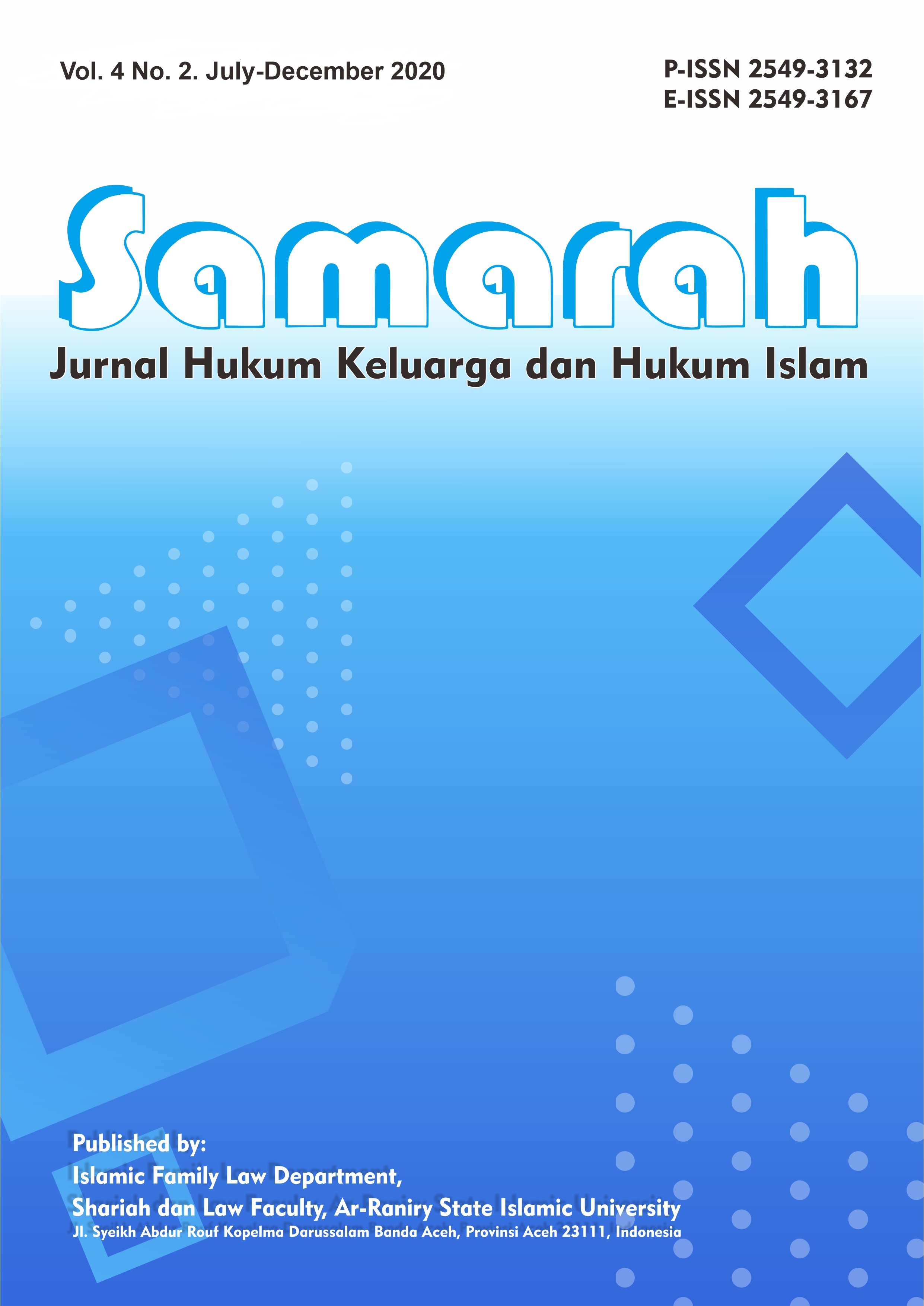The Milk Al-Yamin Concept as a Validity of Sexual Relationship in a Modern Context: an Analysis of Muhammad Syahrur's Thoughts
DOI:
https://doi.org/10.22373/sjhk.v4i2.7068Keywords:
Milk Al-Yamin, Sexual Relations, Modern Context, fiqhAbstract
In the understanding of fiqh turats, the concept of milk al-yamin is affecting the legal protection for oppressed slaves during the Jahiliyah period. According to Syahrur, the concept of milk al-yamin had similarities and differences with the marriage contract. The similarity lies in the ability to have sexual relations, while the difference is that a marriage contract is not merely a sexual relationship, but it has a legal effect on the production of the rights and obligations of a husband and wife to build a family, and other social activities related to mushaharah. Milk al-yamin does not arrive at the emergence of rights and obligations as husband and wife as a result of a marriage contract. The concept of milk al-yamin that Syahrur understands for the present context is how the legal proposition (the Quran) remains suitable with the current era, not to be eradicated historically because it is no longer relevant. He built a new logic for the concept of milk al-yamin in the present context, which is called ‘aqd ihsan. The concept of milk al-yamin understood by Syahrur enables the authorization of contractual marriages or mut'ah which were abolished according to the Sunni school of fiqh. The concept of contract marriage or mut'ah does not have general marriage conditions, because the purpose is not to build a family, but purely sexual relations, and does not belong to the category of formal marriage, although at the same time it is not haram. In consequence, the concept of milk al-yamin is not becoming a basis for legitimizing nonmarital sexual relations.References
‘Abd Allah Nashih ‘Ulwan, Nizham al-Riqq fi al-Islam, Kairo: Dar al-Salam, 2003. Wahbah az-Zuhaili, Fqih al-Islam wa Adillatuhu, Jilid 9, Dar al-Fikr, Damsyiq, 1997.
Al-Qur’an dan Terjemahnya, Mujamma’ al-malik Fahd li Thiba’at al-Mushhaf asy-Syarif Madinah al-Munawwarah P.O. Box 6262, Kerajaan Arab Saudi, t.t.
Khairudddin, Kesaksian Wanita Dalam Pandangan Hukum Islam; Posisi al-Qur`an dan Sunnah Dalam Metode Penetapan Hukum Islam, Sahifa, Banda Aceh, 2018.
M. Tatam Wijaya, Alumni PP Raudhatul Hafizhiyyah Sukaraja-Sukabumi, Pengasuh Majelis Taklim “Syubbanul Muttaqin” Sukanagara-Cianjur, Jawa Barat. https://islam.nu.or.id/post/read/110590konsep-milkul-yamin--hubungan-seks-tanpa-perkawinan-dalam-kajian-fikih.
Muhammad Ali al-Shabuni, Shafwah al-Tafasir, Kairo: Daru al-Shabuni, Volume. 2, 1997.
Muhammad Shadiq ‘Afîfî, Al-Mujtama’ al-Islami wa al-‘Alaqat al-Dawliyah, Kairo: Maktabah Al-Khanzi, 1980.
Muhammad Syahrur, Islam dan Iman: Aturan-Aturan Pokok Rekonstruksi Epistemologis Rukun Islam dan Rukun Iman, (trans. M. Zaid Sudi), Ed. I, IRCiSoD, Yogyakarta, 2015.
Muhammad Syahrūr, Nahw Usul Jadidah li al-Fiqh al-Islami (Metodologi Fikih Islam Modern), Terj. Sahiron Syamsuddin dan Burhanudin, Ed. I, eLSAQ Press, Yogyakarta, 2004.
Muhyar Fanani, Fiqh Madani; Konstruksi Hukum Islam di Dunia Modern, Ed. I, LkiS, Yogyakarta, 2010.
Sayyid Sabiq, Fikih Sunnah, (terj. Drs. Moh. Thalib), Volume 11, PT. Alma’arif, Bandung, 1994.
Tim Kementerian Wakaf dan Urusan Keislaman, Al-Mausu‘ah al-Fiqhiyyah al-Kuwaitiyyah, Kuwait: Darus Salasil, Volume 11, 1427 H.

Downloads
Published
Issue
Section
License
Authors who publish in Samarah: Jurnal Hukum Keluarga dan Hukum Islam agree to the following terms:
- Authors retain copyright and grant the journal right of first publication with the work simultaneously licensed Attribution-ShareAlike 4.0 International (CC BY-SA 4.0) that allows others to share the work with an acknowledgment of the work's authorship and initial publication in this journal.
- Authors are able to enter into separate, additional contractual arrangements for the non-exclusive distribution of the journal's published version of the work (e.g., post it to an institutional repository or publish it in a book), with an acknowledgment of its initial publication in this journal.
- Authors are permitted and encouraged to post their work online (e.g., in institutional repositories or on their website) prior to and during the submission process, as it can lead to productive exchanges, as well as earlier and greater citation of published work. (See The Effect of Open Acces)









